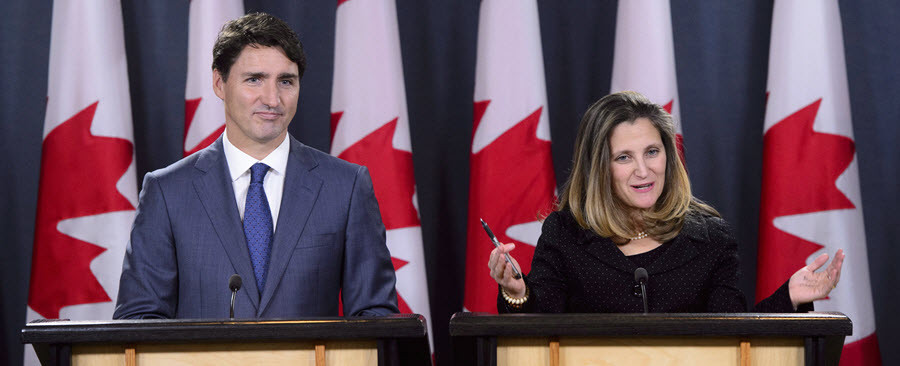From NAFTA to USMCA: The Good, The Bad and…The Rest
Written by The Content Team
Published on October 3, 2018
minute read
Share:
After intensive negotiations, a new United States-Mexico-Canada Agreement (USMCA) has been reached to replace the decades-old North American Free Trade Agreement (NAFTA). Some elements of the hotly debated deal are indisputably good (less uncertainty), others bad (the acronym, some might argue!). Prime Minister Justin Trudeau said reaching the deal was "no easy feat" and U.S. President Donald Trump called it "a terrific deal for all of us." After more than a year of posturing and disputing the details, what does it all mean for the Canadian economy?
In a report titled The USMCA: Manageable Concessions, Less Uncertainty, RBC Economics looks at the particulars and how the deal may affect the economic outlook. In addition, RBC Global Asset Management Chief Economist Eric Lascelles reviewed the deal and overall, concludes: "Happily, there are more winners than losers in this." Let's dig in.
How Did Canada Fare?
"All three countries win in that they have avoided the destruction of one of the most successful trading arrangements on the planet," says Lascelles. "And eliminated a great deal of uncertainty to boot." After much concern and heated negotiations, Canada didn't sacrifice as much as some feared, he notes.
Key Canadian wins
Future Auto Tariffs. The U.S. is currently investigating trade in the auto sector, the outcome of which could lead to significant tariffs. While widely considered unlikely to be applied to Canada, the USMCA deal includes protective measures that would exempt it from U.S. auto tariffs as they remain below its quota on auto and parts exports. According to RBC Economics, this is "perhaps the most important measure for the near-term economic outlook."
Dispute Resolution. NAFTA's Chapter 19 dispute-settlement mechanism, which provides a clear path to resolving violations of the agreement, was a sticking point for Canadian negotiators throughout the process. In the new agreement, the mechanism remains largely intact. According to Lascelles, "This represents the biggest 'win' for Canada, and the biggest sacrifice by the U.S."
60-day Tariff Exemption. Going forward, Canada gets a 60-day "cool-down period" on any new U.S. tariffs or import restrictions under U.S. Section 232 to allow the two countries to negotiate.
Less Uncertainty. While the agreement doesn't remove trade uncertainty entirely, it certainly provides a level of comfort that could stimulate the economy. According to RBC Economics, "Less uncertainty sets the stage for Canadian businesses to put more investment dollars to work."
Key Canadian Concessions
Auto Exports. An earlier agreement between the U.S. and Mexico bumped the "produced in North America" requirement for cars to 75 per cent from 62.5 per cent and added that at least 45 per cent of these vehicles must be produced by people earning at least US$16 per hour. These remain in the new deal, but Canada has also agreed to a quota on auto and auto-parts exports. On the upside, the quota is considerably higher than current export levels, but Lascelles cautions that the cap could pose problems down the road "should auto exports grow over time."
Sunset clause. Rather than an automatic termination after five years unless all three parties agree to extend, as the U.S. originally pushed for, the agreement now lasts 16 years and will be reviewed every six years. Not a full-fledged concession, but not necessarily a win either. In practice, RBC Economics sees this as little changed because NAFTA allowed all parties to terminate with six months notice anyway.
Dairy. The dairy supply management issue has largely been the highlight in Canadian media coverage. The dairy industry wanted the federal government to stand strong on opening up Canadian markets to U.S. dairy products. Canada made some concessions in this regard, agreeing to open roughly 3.6 per cent of the dairy market to U.S. producers. This would reduce the level of supply management for Canadian dairy farmers, but not eliminate it altogether. Canadian Foreign Affairs Minister Chrystia Freeland has noted that the government will compensate dairy farmers for this shift.
While this sits in the "concession" column, Lascelles says, "Given that the net economic effect is probably positive, we have coded this as an improvement to the trilateral trading arrangement, even though it is technically a concession made by Canadian negotiators." Overall, he says the sacrifice is smaller than feared and despite the short-term disadvantage for Canada's dairy industry, the change will likely benefit Canadian consumers.
Other USMCA elements of note:
- Increases the duty-free level for Canadians ordering U.S. goods online to $150 from $20 previously. A Canadian federal tax will be applied on items costing $40 or more
- Copyrights extended to 70 years past death (from 50 years)
- Canadian content exemptions remain largely in place, protecting so-called CanCon art including television, movies and music with preferential treatment
- Length of patents for some biologic drugs extended
- Steel and aluminum tariffs remain in place for the time being, although there have been hints that they may be eliminated in future agreements, Lascelles notes
The Good, The Bad and…The Rest
At the end of the day, the agreement has decreased uncertainty in the economy, which is always a good thing. The experts at RBC Economics say it doesn't affect their base-case economic outlook much at all and it likely won't impact the Bank of Canada's interest-rate decisions going forward.
According to Lascelles, "This new trade deal is in several ways slightly inferior to the one that preceded it. But North Americans can live with it, and that is good enough."
RBC Direct Investing Inc., RBC Global Asset Management Inc. and Royal Bank of Canada are separate corporate entities which are affiliated. RBC Direct Investing Inc. is a wholly owned subsidiary of Royal Bank of Canada and is a Member of the Investment Industry Regulatory Organization of Canada and the Canadian Investor Protection Fund. Royal Bank of Canada and certain of its issuers are related to RBC Direct Investing Inc. RBC Direct Investing Inc. does not provide investment advice or recommendations regarding the purchase or sale of any securities. Investors are responsible for their own investment decisions. RBC Direct Investing is a business name used by RBC Direct Investing Inc. ® / ™ Trademark(s) of Royal Bank of Canada. RBC and Royal Bank are registered trademarks of Royal Bank of Canada. Used under licence. © Royal Bank of Canada 2018. All rights reserved.
The views and opinions expressed in this publication are for your general interest and do not necessarily reflect the views and opinions of RBC Direct Investing. Furthermore, the products, services and securities referred to in this publication are only available in Canada and other jurisdictions where they may be legally offered for sale. If you are not currently resident of Canada, you should not access the information available on the RBC Direct Investing website.
Explore More

7 Ways to Get Ahead Financially in 2026
How you might invigorate your finances and put your money to work more intentionally this year
minute read

Economic Outlook: Uncertainty is Here to Stay, So What's Next?
Takeaways from the Economic Club of Canada’s Annual Event
minute read

3 things: Week of December 15
What the Inspired Investor team is watching this week
minute read
Inspired Investor brings you personal stories, timely information and expert insights to empower your investment decisions. Visit About Us to find out more.







